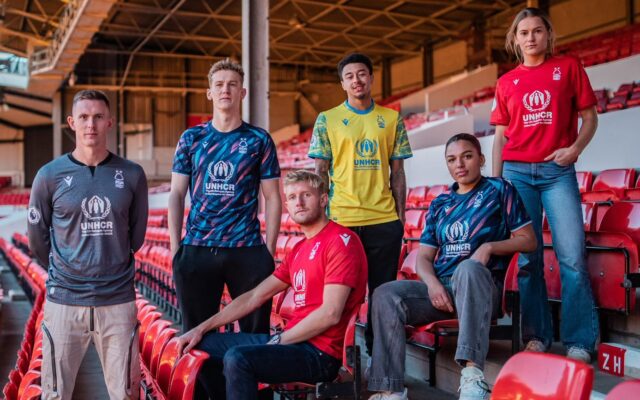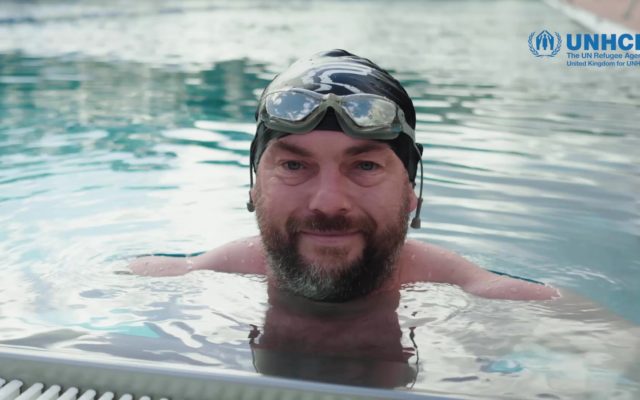Forced to flee and going for gold: sport offers refugees a chance to heal, grow and shine
UK for UNHCR CEO Emma Cherniavksy reflects on her time at the Paris 2024 Olympic Games, what Cindy Ngamba’s win means for refugees everywhere and the unifying power of sport.
29.08.24
Photo credit: © UNHCR
Having spent my childhood years in Paris and many extended visits since then, it was inspiring and poignant for me to experience the Olympic Games in the city for a week in August. Memories of times past mixed in with the excitement of seeing the incredible transformation and mobilisation across the city. It was surreal to see the Champ de Mars, where I spent hours and hours playing as a child, morphed into a proper Olympic venue for Beach Volleyball. And yes – it was the best of all the Olympic venues, move over Versailles!
And there was so much more. Witnessing the talent, determination and resilience of the amazing athletes. Feeling the warm welcome of so many Parisians, volunteers and organisers. Talking with fans and visitors from all over the world, coming together to celebrate the best in sports – from the most agonising moments to the truly exhilarating ones. And at the heart of all of this – seeing Paris shine in its beauty and embrace of everyone.
The sport was (of course) spectacular – I was fortunate to see women’s teams compete in water polo, hockey and volleyball, as well as individual women in golf and table tennis. It was my first time seeing a volleyball match and the athleticism and skill of the teams was incredible. I still cannot get out of my head the cheer [earworm?] when a ball was blocked and shut down by the opposing team – everyone in the crowd would mimic a block with their arms in the air and chant ‘Monster Block, Monster Block, Monster Monster Monster Block’!

Women’s volleyball, China v Serbia.
Cheering for the Refugee Olympic Team
Like everyone else, I was glued to my phone watching the action in other sports, too. Especially the progress of the Refugee Olympic Team. First competing at the 2016 Olympic Games in Rio with 10 athletes, then in Tokyo with a larger team and this year in Paris, 37 refugee athletes competed under the Olympic flag, inspiring millions with their stories of determination and hope.
The journey to the Olympics is a long one for any athlete, but refugee athletes in particular face enormous challenges even before they reach the starting line. In the lead up to the Games, becoming a Refugee Olympian requires an unparalleled amount of focus, dedication and grit. Being forced to flee significantly impacts everything needed to compete on the world stage, whether that’s access to training venues, the right nutrition or quality coaching. It was such a joyous moment when Cindy Ngamba, a refugee from Cameroon who was competing in Olympic boxing in Paris, won the bronze medal – the first Olympic medal to be won by a refugee athlete.
In an exclusive interview with the Olympics, Ngamba stated, “If I was able to overcome those times then I can overcome any situation.” Cindy’s story is testament to what refugees can do when given the opportunity, and her presence on the podium during the Closing Ceremonies along with a handful of athletes joining in to extinguish the Olympic flame was a powerful symbol for refugee inclusion, cheered on by millions of spectators and viewers.
Another highlight was seeing the powerful photo exhibition of Refugees in Sport, with stunning images on the walls of Caserne Napoleon next to Hôtel de Ville – a key Olympics hub and fan zone during the Games. With thousands of Olympic visitors walking around this area daily, the exhibit was a great opportunity to share how sports play a key role in the lives of refugees, displaced people and their host communities – supporting wellbeing, promoting inclusion and providing transformational opportunities for athletes.

“Faced with exile and uncertainty, sport is a beacon of hope for refugees and forcibly displaced people. Beyond physical activity, sport is a powerful vector for protection and integration, for wellbeing and for transformation. Sports can change lives.”
Accessibility and Civil Liberties
Throughout my time at the Games, I was very aware of the privilege of being there in person and having the means to buy tickets to several events. It was great that some Olympic events were quite accessible in terms of cost; for example, a ticket to watch Olympic golf for a full day on the course was 24 euros, and public transport was 10 euros a day all-inclusive across the network, including the suburbs. Tickets were exclusively sold and re-sold through the Olympic platform/app which helped prevent price inflation. However, some events like athletics and equestrian were completely out of reach with ticket prices of 400-500 euros. With empty seats seen at some venues throughout the Games, especially in the qualifying rounds, this was a missed opportunity to make the Games more accessible to the public and to local community groups like young athletes.
Security and police forces were a constant presence alongside the legions of volunteers, organisers, athletes and fans. I expected a tense atmosphere following the incidents of sabotage on the rail network that had occurred on the first day of the Games, but for the most part I experienced security patrols and checkpoints where people were treated with calm and respect. Sadly, on my last night I witnessed a disturbing incident in central Paris where a passing cyclist nearly collided with two policemen who stepped into the cycle lane, following which they threw him to the ground and handcuffed him even though it was clear to bystanders like me that the cyclist was not at fault. It was a sobering reminder that police brutality remains a threat to civil liberties in France and many other countries, and that large sporting events like the Games always come at a cost, especially when it comes to marginalised groups like migrant workers, people who are homeless and those at risk of racial discrimination and abuse.
The broader refugee sporting story
At UK for UNHCR, we’ve witnessed first-hand the transformative power of sport. Sport can profoundly change the trajectory of a displaced person’s life; it can create new opportunities, provide protection, empower communities and serve as a catalyst for inclusion – helping refugees, asylum-seekers and internally displaced people connect with their new communities.
In the UK, we’ve seen the power of sport in bringing communities together time and time again. One example, that features in our Great British Welcome series, is the monthly ‘Refugees Rock’ climbing sessions at The Climbing Hangar, an indoor bouldering centre in Liverpool. ‘Refugees Rock’ is coordinated by climbing enthusiasts who welcome people who have been forced to flee, into a community that prides itself on promoting inclusivity, trust and a sense of belonging.
In London, refugee and local community girls recently came together for an unforgettable tournament at the iconic Somerset House for the Stronger Communities Cup, which was organised together with the EFL and UEFA.
To make sports accessible for refugees around the world, partnerships are key. In December 2022, Nottingham Forest FC partnered with UK for UNHCR to support global relief efforts and awareness raising. The announcement of the Nottingham Forest FC partnership was widely supported by fans who flocked to its stores to add the UK for UNHCR logo to their shirt and donate as a sign of solidarity.
When it comes to inclusivity and ensuring sport is accessible to refugees everywhere, there’s a long way to go, but much to celebrate.
Looking ahead
The action is far from over. From 28 August to 8 September, the Paralympic Games will unfold in Paris, with a record eight refugee Para-athletes competing in the Refugee Paralympic Team.
From the amazing Paralympic swimmer Ibrahim Al Hussein who fled conflict in Syria, to UK-based vision-impaired athlete Guillaume Junior Atangana, this is the largest ever Refugee Paralympic Team to compete.
Striving for gold, these eight Refugee Paralympians represent strength, endurance and perseverance. They bring a message of hope and an inspiring reminder of all that refugees can achieve when given the opportunity and the support. Please do join me in supporting them and #CheerForRefugees throughout the Paralympic Games.
For more information on the Refugee Paralympic Team, visit this website.




